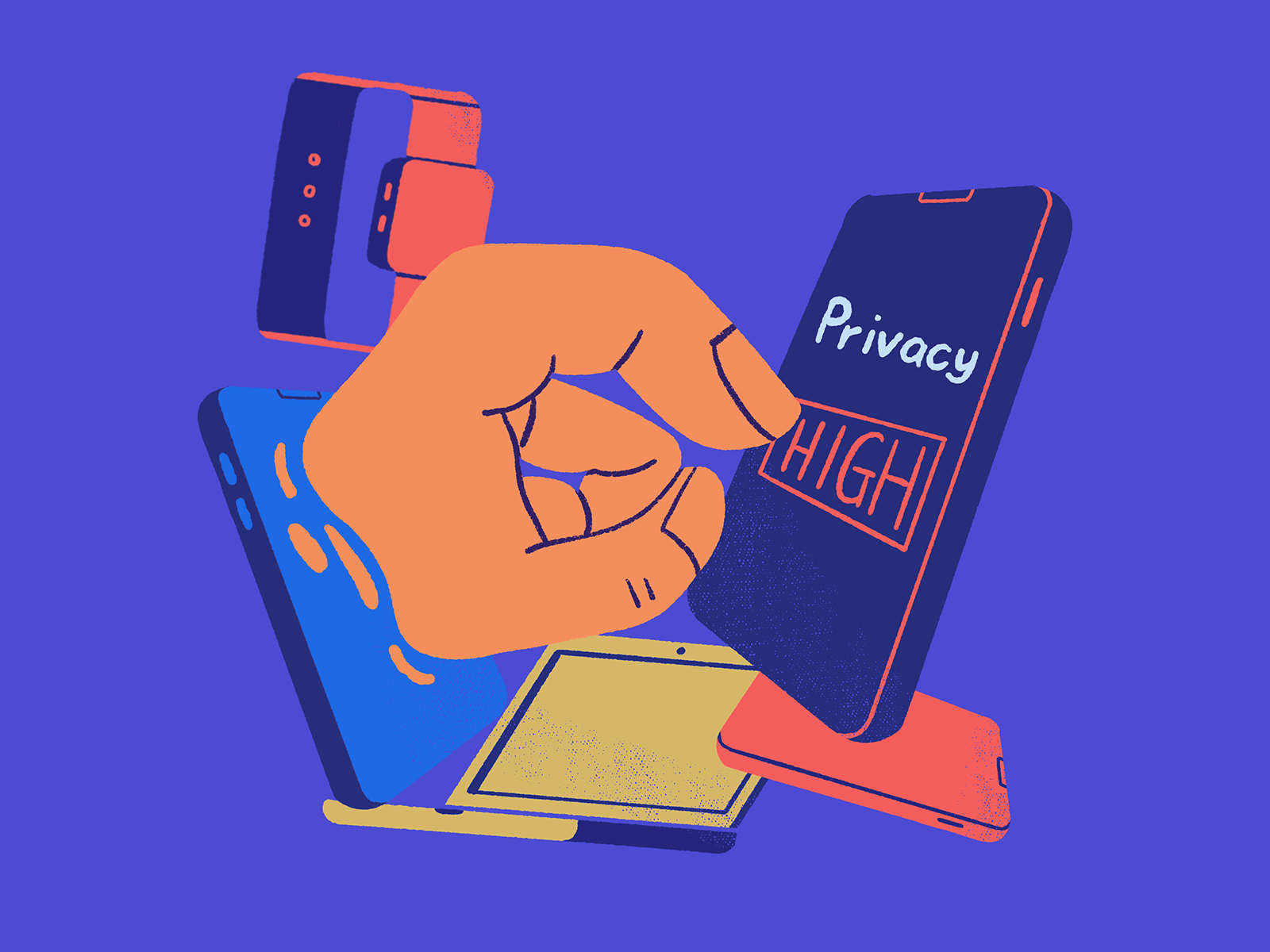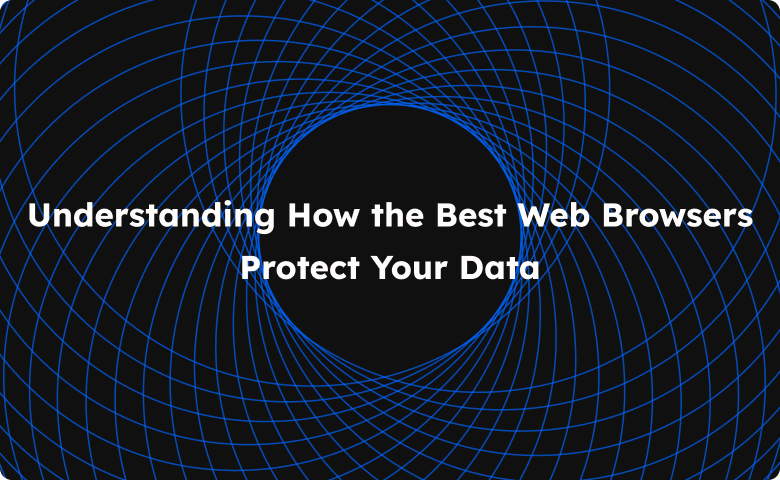Either on Windows 10 to iPhones, Making Your Ultimate Choice Between the Best Browsers for privacy In 2024
Chances are, you've stumbled across this infographic recently. It's a snappy little visual that perfectly captures the paradox of web browsers: they're a bit rare on the innovation front, yet they're pretty much everyone's go-to tool for diving into the vast ocean of the internet. Think about it - for most of us, a browser is our first ticket to the online world.
Web Browsers And Their Share of Traffic Over The Years
Web Browsers, an Introduction
Most of our devices come with a pre-installed browser and it also creates a sense of ecosystem with your data - your passwords, most used tabs, and your workflows. In favour of convenience, most of us don't bother to read the fine print especially when it comes to the more well known browsers in the space.
Read up our previous blog about how Chrome could be fudging your system memory.
Now, let's talk about big numbers. How about Google's whopping $20 billion to be Apple users’ go-to browser? Mind-boggling, isn't it? But it all starts to make sense when you peek behind the curtain at how browsers really make their revenue. And hey, this might even give you a clue as to why we don't see groundbreaking changes in browsers as often as we'd like.
To begin with, Neverinstall allows you to open any search engine you are a fan of, and access it without your personal data getting into the risk of being leaked. As you set up a cloud PC with a server in any location in the world, it acts like a VPN and everything you consume and create inside your PC remains yours.
How Browsers Make Revenue?
In the bustling world of web browsers, how they make money is as diverse as the browsers themselves. Let's break it down into four main streams: advertising, data collection, premium features, and partnerships for enterprises.
- Advertising: Ah, the old faithful! Just like Google Chrome, many big-name browsers make their bucks through ads. Whether it's ads popping up in search results or sneakily sitting on web pages, they're often tailored to you based on your browsing data. Handy, but a bit Big Brother, right? It's a lucrative game, but one that needs to play nice with privacy concerns.
- Data Collection: Now, this is where things get a bit more... let's say, intriguing. Some browsers are like the undercover agents of the internet, quietly collecting your data and selling it to the highest bidder. It's a lucrative route, but it sure does raise some serious privacy red flags. It's all about walking that tightrope between making a profit and keeping it ethical.
- Premium Features: Moving on from the basics, some browsers are like the VIP section of a club. Think Opera and its fancy VPN service. These premium features come with a price tag but offer you a little something extra. It's not just about surfing the web anymore; it's about doing it with style and extra perks. It relies a lot more on user loyalty to the product to then push them into the premium bucket.
- Enterprises Partnerships: Last but not least, some browsers mean serious business – literally. They offer specialized solutions for enterprises, complete with top-notch security and all the bells and whistles a business could need. It's a bespoke service for those who value privacy and security above all else.
But wait, there's more! Beyond these four, we've got browsers cozying up with search engines (like Firefox and Safari's deal with Google), earning a share from search ads. Then there's the low-key world of affiliate marketing and e-commerce, where browsers earn a quiet commission. For the adventurous, there's even the crypto-rewards model, like Brave Browser's approach to rewarding users for ad views. And let's not overlook the marketplace for browser extensions and add-ons.
From displaying ads to offering premium, swanky features, each browser has its unique way of filling its coffers, all while trying to keep us, the users, happy and secure.
What's Driving The Need For Browser Privacy

Top Web Browser Choices in 2024: A Detailed Look
Before we go deep on the existing best browsers for privacy, get ready for a quick world tour of web browsers. Buckle up, because we're diving into the unique flavours each one brings to the table.
- Google Chrome: The universal favorite, especially in India. It's the Usain Bolt of browsers – speedy, with a knack for integrating Google services and boasting an array of extensions. But, it's a bit of a memory guzzler. Dominating the scene since 2008.
- Safari: The American sweetheart, reigning supreme on mobile. It's all about melding seamlessly with the Apple ecosystem, and it's big on privacy. Apple-exclusive, though – sorry, non-Apple gang! Strutting its stuff since 2003.
- Microsoft Edge: Making waves globally, this one’s a buddy for all things Microsoft and has a soft spot for older websites. Yet, it lags behind Chrome in the extension race, that's something their partnership with OpenAI is definitely bound to change up.
- Firefox: A hit in the USA and Russia. This one’s for the privacy-conscious and the customization fans, being open-source and all. It's not the fastest kid on the block, but it's got heart. A trusted companion since 2002.
- Opera: Catching eyes in Africa and Europe, Opera comes with a built-in VPN, ad blocker, and even a battery-saving mode. It's like that cool, niche indie band everyone secretly loves. Rocking the scene since 1995.
- Samsung Internet: Big in Asia, especially South Korea. It's tailored for Samsung devices and puts privacy first. But it's mostly a Samsung-exclusive party. Joining the fray in 2012.
- UC Browser: A major player in Asia, particularly China and India. Known for its lightning-fast downloads and data compression, but it's had its share of privacy controversies. On the scene since 2004.
- Android Browser: Popular in developing countries, it's simple, light, and Android-friendly. However, it's a bit old-school and not the most secure option out there. Been around since 2007.
- 360 Safe Browser: China's guardian browser, packed with security features and cloud services. However, its fan base is primarily in China. Its debut year remains a mystery.
- Yandex Browser: A big deal in Russia and Eastern Europe. It's got a turbo mode for slow connections and doesn't skimp on security. Yet, it's not as popular beyond its home turf. Entering the race in 2012.
- Brave Browser: A global name, Brave stands out with its privacy-first approach, ad-blocking, and unique cryptocurrency rewards. However, its revenue model might not click with everyone. Brave-ing the world since 2016.
- Vivaldi: Worldwide appeal, but with a smaller fan base. It's highly customizable, privacy-focused, and even has a neat note-taking feature. A newer face in the browser world, starting in 2016.
- Arc Browser: Emerging on the global stage with integrated apps, an innovative user-first UI, and a focus on privacy. It's still finding its feet with limited platform availability and a bit of a learning curve. The latest entrant, joining in 2021
For a more elaborate review of each of these, check out Efficient's blog on the same.
In our digital universe, privacy isn't a mere luxury; it’s an absolute must-have. The call for stronger privacy in browsers has become louder and clearer, and for good reasons. Let’s dive deeper, shall we?
First, the headline-worthy breaches that rocked our digital trust:
- Yahoo's Catastrophic Combo (2013 & 2014): Imagine 3 billion accounts exposed in 2013, followed by 500 million in 2014. It’s not just about emails; we're talking personal data laid bare.
- Microsoft's 2021 Snafu: Millions hit by a software glitch and a cyberattack. It’s akin to leaving your digital doors wide open.
- Facebook's Privacy Pitfall (2021): A staggering 530 million users' details, including phone numbers and emails, thrown into the open.
- Marriott’s Data Debacle (2014-2018): 383 million guests’ data, including sensitive personal details, exposed over four years.
- Aadhaar’s Security Slip (2018): A billion Indian citizens’ personal and biometric data compromised.
- First American Financial Corp.'s Security Slip-Up (2019): 885 million records, from social security numbers to financial details, left unprotected.
These events are more than cautionary tales; they're a wake-up call for bulletproof privacy in web browsers.
But there's more fuelling the privacy revolution:
- Ad Intrusion & Surveillance Concerns:
It’s like being shadowed online. Our every click and scroll, tracked by digital ads. For some, it’s not just about marketers; it’s the government surveillance that’s unsettling. - Digital Dangers & Growing Awareness:
The more we live online, the more we risk identity theft - a silent but ever-present threat. High-profile data missteps have turned us into privacy sleuths, ever vigilant and informed. - Legal Reforms & Consumer Shifts:
Laws like GDPR and CCPA are reshaping the privacy landscape, making both users and tech giants more privacy-conscious. A significant shift towards privacy-first choices in digital consumption is emerging. - Tech Vulnerabilities & Sophisticated Threats:
Public Wi-Fi networks are digital battlegrounds for privacy. The evolving sophistication in data collection also demands smarter privacy defenses.
In response, browser developers are upping their game with tools like tracking protection, ad-blocking, and encrypted browsing modes. This isn't just a passing trend; it’s a movement, recognising that in our online world, privacy is the cornerstone, not just an add-on.
How Neverinstall Tackles Browser Privacy
Amidst this clamor for enhanced privacy and security, there's a shining beacon: Neverinstall. It’s not just another tool in your digital arsenal; it’s a game-changer in how we interact with the web, blending seamlessly with our growing need for ironclad security. Let's break down how Neverinstall turns the tide in our favour:
- Fortified Cloud Security: Imagine a fortress in the cloud - that's Neverinstall for you. It’s like having a digital guardian, ensuring that your online activities are safely ensconced within robust cloud security measures. This isn’t just about keeping your data under lock and key; it’s about peace of mind.
- Double-Layered Data Protection with CloudLink: Neverinstall introduces a novel concept - 'CloudLink'. It lets you connect your existing cloud accounts, adding an extra layer of security to your data, and you can access Neverinstall's intuitive interface over your data. Think of it as a safety net layered over another safety net.
- VPN-like Privacy Shield: In the world of Neverinstall, privacy is paramount. It acts like a VPN, keeping your browsing and other application activities anonymous and secure. Whether you're checking emails, shopping online, or streaming, your digital footprint is masked, keeping prying eyes at bay.
- Shared Browsing and Collaboration Without the Threat: Collaboration online is the new norm, but it often comes with privacy risks. Neverinstall revolutionises this by offering shared browsing and collaboration features without compromising on security. Collaboratively browse, share, and interact, all within a secure bubble.
- Lightning-Fast Internet Speeds: Slow internet is a buzzkill, especially when you’re knee-deep in work or entertainment. Neverinstall isn't just about security; it's also about speed. Experience blazing-fast internet speeds that transform your desktop experience into a seamless, swift adventure.
Neverinstall isn’t just to enable you to access hardware specifications beyond your device's reach; it’s a testament to how far we've come in prioritising security and privacy on the internet. It aligns perfectly with the current drive for browser privacy, offering a sanctuary in the digital wilderness. From cloud security to high-speed browsing on any browser of your choice, your data still remains protected by the virtue of your virtual machine. It’s not just about staying safe; it’s about browsing with confidence and speed, knowing you're backed by the best in cloud security. You can also check out our privacy blog for a deeper dive on Neverinstall's and other cloud PCs in the market take on data protection.



Join the conversation.